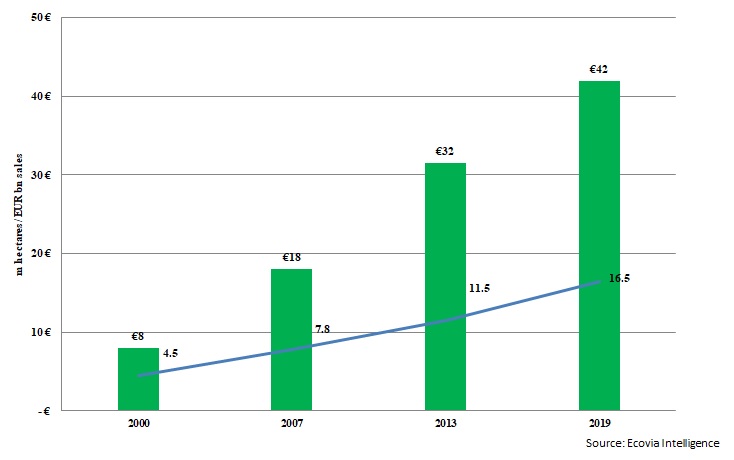As part of the EU’s Farm to Fork strategy, the European Organic Action Plan has set a target of 25% organic farmland by 2030. Ecovia Intelligence (formerly known as Organic Monitor) believes demand stimulus will be the key to achieving this target.
Organic food sales have increased from EUR 8 billion to EUR 42 billion over two decades (2000-2019). Although sales have increased over five-fold, organic products still represent less than 4% of food sales in Europe. In comparison, organic agriculture represents 8.1% of European farmland.

To achieve the 25% target, organic farmland and food production will need to triple over 10 years. The EU plans to accelerate the conversion rate by providing financial support. This will come from the Common Agricultural Policy, greater research into organic farming, and promotion funds.
The EU plans to elevate demand and build consumer trust in organic foods. It will continue to raise visibility of the EU organic leaf (logo). There is likely to be legislation for green public procurement. Various governments, including those in Denmark, Sweden and France, are already encouraging schools, government buildings, and catering establishments to source organic foods.
At the upcoming Sustainable Foods Summit, it will be shown how the private sector can play a more important role. Most of the growth in the European organic food market in the last two decades has been driven by the private sector, especially large food retailers. Supermarkets generate most organic food sales in almost all European countries. Retailer private labels of organic foods, such as Carrefour Bio (France), Rewe Bio (Germany), AH Biologisch (Netherlands), and Ja! Natürlich! (Austria) are well established and have high market share.
There is also a need to build efficient supply chains from growers to retailers. Farmers can be encouraged to convert to organic practices, however there needs to be a growing market for their organic products. The organic meat and dairy sectors have previously experienced overproduction; organic milk & meat products went into the conventional food market as demand fell short of supply.
Consumer demand is a bigger challenge. Various research studies show a small group of consumers represent most organic food sales. Although there is rising awareness of organic foods, most European consumers are not willing to pay the premium. The price differential is the major barrier to higher organic product purchases.
If the Organic Action Plan is to be successful, the EU should try and make organic products affordable to all. Organic foods should not be limited to consumer groups with high purchasing power. The popularity of organic foods in countries like Denmark (12% market share), Switzerland (10%) and Austria (9%) is partly because retailers have made organic foods affordable. The private sector, especially discounters and low cost retailers have been able to ‘democratise’ organic foods.
Ecovia Intelligence believes demand stimulus will be the key to the success of the EU organic action plan. The 25% share of farmland is possibly achievable, however a market share of 10% (organic food sales) would be more ambitious.
Posted: May 3rd 2021
For permission to publish our research insights, please contact our media department

